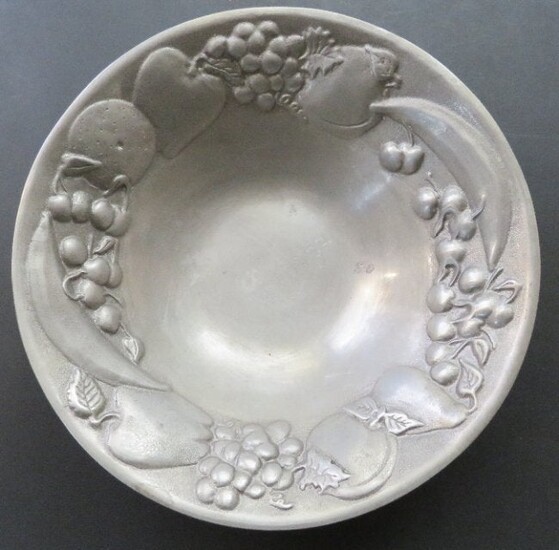Wilton Armetale Metal Fruit Bowl, RWP, 1970s
Fruit Bowl, marked RWP, by Wilton Armetale, 1970s.
Wilton, PA metal casting company developed and patented a new metal alloy, registered as Armetale in 1963. Wilton Armetale is a fusion of 10 different metals, a sand-cast alloy that looks similar to pewter, but does not contain silver or pewter. It imparts the warmth and patina of fine pewter.
It is an unique, non-toxic, food-safe metal that looks like pewter but it is stronger, more durable and has superior heat + cold retention ability. Armetale metal has been analyzed by the U.S. Food and Drug Administration (FDA) and an independent third party laboratory and conforms to guidelines for the safe handling of food and beverages. The Armetale formula remains a closely guarded family secret. When cast, this metal alloy can be worked to acquire the look of pewter or be highly polished to resemble silver. Products made from Armetale are functional as well as beautiful. The tarnish-resistant alloy will not crack, chip, or dent; and its ability to retain temperatures makes it versatile for heating, chilling, and serving. Design is an important element of Wilton Armetale's products, so it is fitting that the name Armetale means art metal.
Wilton Armetale's products were produced by using an ancient painstaking process called sand molding, whereby an impression formed in sand is filled with molten metal. Since items are individually cast and meticulously hand-finished, no two pieces are exactly alike.
The Wilton family has been involved in the metal casting industry since 1892. At that time, the foundry produced industrial iron castings for other manufacturers. Half a century later, Ralph P. Wilton, Jr. expanded the family business through other ventures, such as Wilton Products (1940) which made cast iron gifts and the Wilton Brass Company (1955) which initially produced industrial brass, aluminum, and iron castings. The company's greatest success occurred in 1963 when Wilton, Jr. developed the formula for a unique aluminum-based alloy called Armetale, which led to a new line of Wilton products. In 1969, the Wilton Brass Company relocated to Mount Joy, Pennsylvania and changed its name to reflect its new direction. In c. 2010, the fourth generation of Wilton Family discontinued production and sold their business.
US: Priority (c.2-4 days) ----------- $27.50
Canada: 1st Class (c.2-6 weeks) ---- $35.50
World: 1st Class (c.2-8 weeks) ----- $45.50
Condition Report: The bowl is 9.1/4” [23.5cm] across at the top, and 2.1/2” [6.4cm] deep; very good condition.
View it on
Estimate
Time, Location
Auction House
Fruit Bowl, marked RWP, by Wilton Armetale, 1970s.
Wilton, PA metal casting company developed and patented a new metal alloy, registered as Armetale in 1963. Wilton Armetale is a fusion of 10 different metals, a sand-cast alloy that looks similar to pewter, but does not contain silver or pewter. It imparts the warmth and patina of fine pewter.
It is an unique, non-toxic, food-safe metal that looks like pewter but it is stronger, more durable and has superior heat + cold retention ability. Armetale metal has been analyzed by the U.S. Food and Drug Administration (FDA) and an independent third party laboratory and conforms to guidelines for the safe handling of food and beverages. The Armetale formula remains a closely guarded family secret. When cast, this metal alloy can be worked to acquire the look of pewter or be highly polished to resemble silver. Products made from Armetale are functional as well as beautiful. The tarnish-resistant alloy will not crack, chip, or dent; and its ability to retain temperatures makes it versatile for heating, chilling, and serving. Design is an important element of Wilton Armetale's products, so it is fitting that the name Armetale means art metal.
Wilton Armetale's products were produced by using an ancient painstaking process called sand molding, whereby an impression formed in sand is filled with molten metal. Since items are individually cast and meticulously hand-finished, no two pieces are exactly alike.
The Wilton family has been involved in the metal casting industry since 1892. At that time, the foundry produced industrial iron castings for other manufacturers. Half a century later, Ralph P. Wilton, Jr. expanded the family business through other ventures, such as Wilton Products (1940) which made cast iron gifts and the Wilton Brass Company (1955) which initially produced industrial brass, aluminum, and iron castings. The company's greatest success occurred in 1963 when Wilton, Jr. developed the formula for a unique aluminum-based alloy called Armetale, which led to a new line of Wilton products. In 1969, the Wilton Brass Company relocated to Mount Joy, Pennsylvania and changed its name to reflect its new direction. In c. 2010, the fourth generation of Wilton Family discontinued production and sold their business.
US: Priority (c.2-4 days) ----------- $27.50
Canada: 1st Class (c.2-6 weeks) ---- $35.50
World: 1st Class (c.2-8 weeks) ----- $45.50
Condition Report: The bowl is 9.1/4” [23.5cm] across at the top, and 2.1/2” [6.4cm] deep; very good condition.



